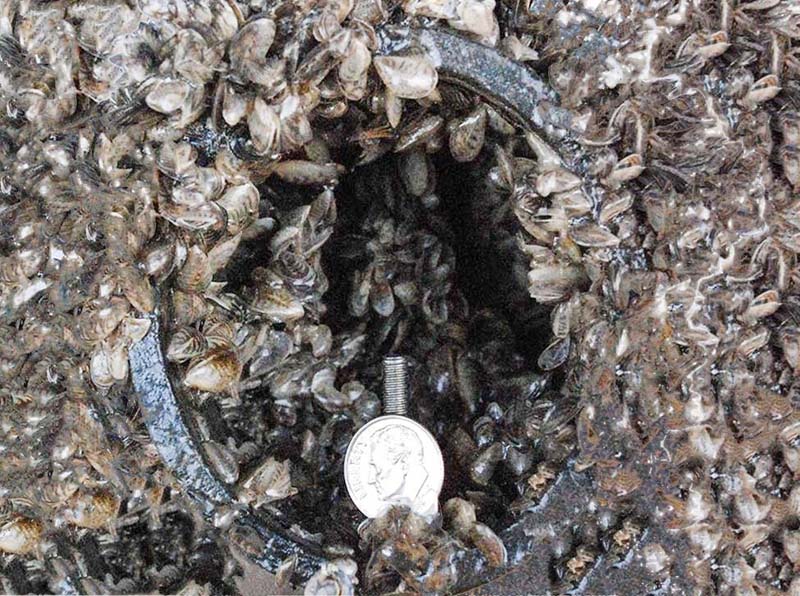
With spring like temperatures spoiling southern Alberta residents, the thoughts of many are already turning to summer. The upcoming season of camping and boating can be exciting, but some are already heeding the warning regarding aquatic invasive species and the impact it could have on our lake.
Invasive mussels, namely Zebra and Quagga species, have been spreading across North America. They cover and foul water infrastructure and recreation areas, and change the ecology of lakes. Once established, dealing with them costs millions of dollars each year. Now, only the 3 western Provinces and the 5 Pacific Northwest States are free of mussels. These mussels spread quickly and the main means of transfer from one lake to another is recreational boats. Costs will be huge if we don’t keep them out. The key to keeping these little nightmares out of our lake is that the public needs to know what is happening and make a commitment to do their part to keep mussels out of our waters. Government needs to put in legislation that will help keep mussels out and participate in programs that will help in public awareness and action.
What risk do these bring? It is very important to know that once they are established, they stay forever. There is no way to get rid of them or to remove them from where they make their home. Once established mussels are almost impossible to eradicate. One female produces over a million eggs per year and their spread is rapid.
The Government of Alberta has analyzed the impact of mussels and determined that an annual cost of $75 million would be incurred by water infrastructure operators in dealing with mussel fouled facilities and equipment. Irrigation districts in Alberta, which includes the WID that controls Chestermere’s lake, have 8,000 km of canals and pipelines plus many structures that are all at risk from mussels. Pipelines are of particular risk since they provide ideal habitat for the mussels, including a place to attach and a constant food supply. Irrigation districts in their drive to improve water use efficiency have installed over 3,000 km of pipelines and many automated structures for better water control. Mussels are a threat to this infrastructure and the efficiency gains they have produced.
Invasive Zebra and Quagga mussels attach to and coat objects in water bodies with layers of shells, which reduces pipe capacity and interferes with operation of water control infrastructure. Mussels attach to any hard object, but of particular concern they attach to water intakes, pipelines, boats, water control structures, valves, docks, etc. They mess up beaches and produce sharp shells that are difficult to clean up and are a hazard. They can completely change the ecology of a lake, including the elimination of species of fish; this has happened in as little as eight years in a lake and when they die, they can make quite the stink.
So, how do we keep our lake safe? Well, Alberta’s Irrigation Districts are an active part of the team working to prevent the infestation of Alberta’s waters by invasive mussels and are developing a fund totalling $100,000 to invest in mussel prevention. But where Chestermere residents come into play is ensuring that boats coming in and out of our lake are clean. “Clean, Drain, and Dry Your Boat” is basically the process that is imperative to keeping boats in proper shape to ensure these invasive mussels haven’t hitched a ride and ruin our lake.
Alberta Environment and Sustainable Resource Development department gives this advice on how to keep Alberta waters free of aquatic invasive species, and keep your boat and recreational equipment in ship-shape. The ‘Clean’ portion of the initiative states boaters should clean and inspect watercraft, trailer and gear. Remove all plants, animals, and mud at the access area or dock. At home, soak your gear in a bleach solution for at least one minute. Rinse, scrub or pressure wash your boat away from storm drains, ditches or waterways.
Then ‘Drain’ on land, before leaving the waterbody, drain all water from: Bait bucket, Ballasts, Bilges, Coolers, Internal compartments, Livewells, etc. Then, ‘Dry’ the watercraft and gear completely between trips and allow the wet areas of your boat to air dry. Leave compartments open and sponge out standing water. For quick tips on how to avoid spreading aquatic invasive species by cleaning your boat, see https://www.youtube.com/watch?v=8lEcDnLDpz8.
So during the upcoming boating season, if you think you’ve spotted a quagga or zebra mussel you are asked to report it to Alberta’s invasive species hotline at 1 855 336 BOAT (2628).








